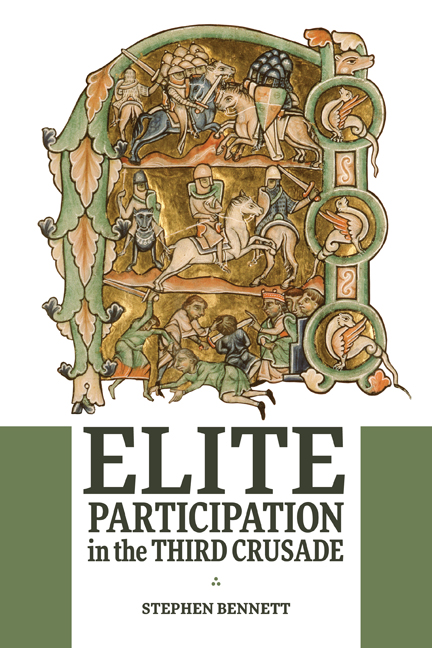Book contents
- Frontmatter
- Contents
- List of Illustrations
- Preface and Acknowledgements
- List of Abbreviations
- Notes on Sources, Names, and Coinage
- Map
- Introduction
- 1 Faith and Finance: Religious Foundations, Ecclesiastical Leaders, and Fraternity
- 2 Family and Heritage: Lineage, Kinship, and Tradition
- 3 Locality and Fellowship: Territory, Trade, and Tournaments
- 4 The Household of King Richard I at the Time of the Third Crusade
- Conclusion: Personal, Spiritual, and Communal Influences on Participation in the Third Crusade
- Appendices
- Bibliography
- Index
- Warfare in History
- Frontmatter
- Contents
- List of Illustrations
- Preface and Acknowledgements
- List of Abbreviations
- Notes on Sources, Names, and Coinage
- Map
- Introduction
- 1 Faith and Finance: Religious Foundations, Ecclesiastical Leaders, and Fraternity
- 2 Family and Heritage: Lineage, Kinship, and Tradition
- 3 Locality and Fellowship: Territory, Trade, and Tournaments
- 4 The Household of King Richard I at the Time of the Third Crusade
- Conclusion: Personal, Spiritual, and Communal Influences on Participation in the Third Crusade
- Appendices
- Bibliography
- Index
- Warfare in History
Summary
Let those who for long were brigands now become soldiers of Christ. Let those who once fought against their brothers and blood relatives fight lawfully against barbarians. Let those who until now have been mercenaries for a few coins achieve eternal rewards.
Pope Urban II, Clermont, 1095The response to Pope Urban II's call to arms at Clermont in 1095 was overwhelming and the subsequent campaign to aid Byzantium and liberate the Holy Land established a number of new states in western Asia. This campaign came to be known as the First Crusade and its conquests as the Latin East, the Crusader States, or Outremer – the lands over the sea. The greatest of these polities was the kingdom of Jerusalem based on the Holy City captured in the final stages of the First Crusade in July 1099.
Over the next hundred years, Latin settlers aided by waves of crusaders sought to defend their conquests against growing Muslim pressure. Whilst Edessa had fallen to Muslim forces in 1144, the remaining Crusader States seemed relatively secure. Yet, in 1187, Salah ad-Din Yusuf (Saladin r.1174–1193) annihilated Latin forces under Guy of Lusignan, king-consort of Jerusalem, at the battle of Hattin (4 July 1187), and seized control of the majority of Guy's kingdom, including its capital. The Third Crusade (1187–1192) sought to recover Jerusalem and re-establish Latin control over the Holy Land.
When word reached Europe of Saladin's destruction of the army of the kingdom of Jerusalem at Hattin and his capture of the True Cross, Pope Urban III was said to have fallen dead in shock. Even before Archbishop Joscius of Tyre had spread the news of the fall of Jerusalem, hundreds across Latin Christendom rushed to take the Cross – to pledge themselves to a crusade. Amongst their number was Richard ‘the Lionheart’, duke of Aquitaine and heir to the throne of England (1157–1199), who risked the ire of his father, Henry II, in taking the vow without permission. Tens of thousands more joined them in response to a call for a crusade by the new pope, Gregory VIII, and the efforts of his preachers at mass cross-taking ceremonies.
- Type
- Chapter
- Information
- Elite Participation in the Third Crusade , pp. 1 - 28Publisher: Boydell & BrewerPrint publication year: 2021



